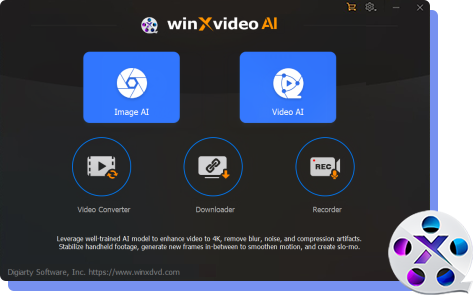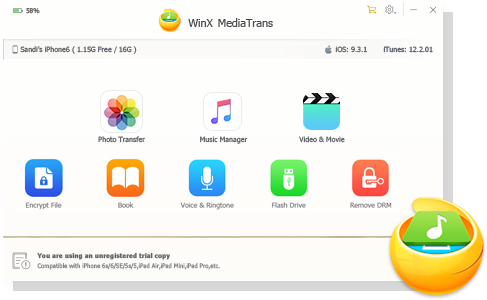AV1 vs HEVC/H.265 - Which is the Codec of the Future?
Now that 4K and 8K ultra-high definition contents are becoming mainstream, advanced video compression standard, aka video codec, is here to offer better video quality and lower bandwidth costs. The two most efficient codecs today are the High Efficiency Video Codec (HEVC) and AOMedia Video 1 (AV1) standards.
What are the differences between AV1 and HEVC? Specifically, the winner will be the video codec that will tackle the dimensions: compression efficiency, computational performance and compatibility. If you want to dive into the codec fight, we are now gearing up for the AV1 vs HEVC comparison, in performance, file size, quality, and the compatibility.
AV1/HEVC won't Play? Get Free HEVC/AV1 Video Decoder
WinXvideo AI - Easily decode 4K/8K videos in HEVC/AV1 and encode videos to HEVC, MP4, H.264, MPEG, MOV, WMV, etc. for easy playback on old and incompatible PCs/Macs, TVs and portable devices. Nvidia, AMD, and Intel hardware acceleration supported.
AV1 vs HEVC Side-by-Side Comparison:
If you don't want to bother with the detailed discussion, check the AV1 vs HEVC conclusion below:
- AV1 is royalty-free while HEVC is royalty bearing.
- AV1 can save up to 30% file size than HEVC for the same image quality.
- AV1 requires more powerful hardware to decode, and it takes much longer time to decode than HEVC.
- HEVC is supported by GPU/CPU from AMD, Nvidia, Intel, Apple, Qualcomm, etc. The support for AV1 decoding is already here but the AV1 encoding is by far supported by Nvidia and Intel only.
You may be also intertested in: AV1 vs VVC, HEVC vs VVC, H.265 (HEVC) vs H.264 (AVC)
1. AV1 vs HEVC - Royalty Fee
Summary: AV1 is royal free while hevc is not.
AOMedia Video 1 (AV1) is the successor to VP9, developed by the Alliance for Open Media, a consortium of the largest tech companies including Intel, Amazon, Apple, Facebook, Google, Microsoft, Mozilla, and Netflix (see all the members below). Due to the vague and expensive HEVC licensing structure, AOMedia decided to create a royalty-free standard that is able to provide better performance than HEVC.
HEVC codec is the successor to AVC, developed by Moving Picture Experts Group (MPEG) and the Video Coding Experts Group (VCEG) for encoding and decoding video streams more efficiently and economically. HEVC has a very complicated and expensive royalty structure. Therefore, the joint shareholders from MPEG LA, HEVC Advance, and Velos Media - which including Ericsson, Panasonic, Qualcomm, Sharp, and Sony, all have different license fees on HEVC. The detailed royalty fees are listed below (Source: Wiki):
Codec |
Licensor |
Codec Royalties |
Royalty Exemptions |
Royalty Annual Cap |
Content |
HEVC |
MPEG LA |
US$0.20 per unit |
First 100k units each year |
US$25 million |
US$0 |
HEVC |
Region 1: |
▪ US$25,000 each year |
US$40 million |
Physical distribution: |
|
Technicolor |
tailor-made agreements |
tailor-made agreements |
tailor-made agreements |
US$0 |
|
Velos Media |
? |
? |
? |
Presumed to charge royalty |
|
others (AT&T, Microsoft ...) |
? |
? |
? |
? |
|
AV1 |
Alliance for |
US$0 |
N/A |
N/A |
US$0 |
Hot Search: Does Adobe Premiere Pro Support AV1 Encoding, How to Encode AV1 with FFmpeg
2. AV1 vs HEVC - Compression Efficiency
Summary: AV1 codec is 30% more efficient than H.265
According to tests conducted by Moscow State University, AV1 can outperform HEVC by about 28% in the encoding and decoding efficiency. As per the performance graph from the Graphics & Media Lab Video Group, MSU below, AV1 is able to provide the same quality as X264 at 55% of the avg. bitrate while the best HEVC encoder (x265 in three-pass Placebo mode) runs at 67% of the bitrate. In other words, with AV1, distributors can send streams faster and cheaper and we can enjoy higher-definitions via the same bandwidth.
The efficiency gains in AV1 over HEVC makes streaming HDR 4K video with wide color gamuts much more feasible. It can go as far as 8K at up to 120fps, 800mbps. 360-degree video can also use AV1 to deliver similarly high data demands.
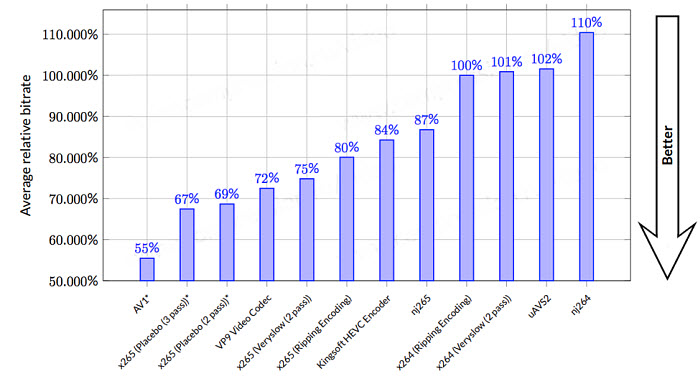
3. AV1 vs HEVC - Quality
Summary: AV1 codec delivers better image quality than H.265/HEVC
While AV1 has better compression efficiency, is there any quality differences between AV1 and HEVC? As 4K video formats, both AV1 and HEVC has good quality. But small differences still exist. According to the quality chart among four codecs (namely AV1, X265, LibVPx, and X264) based on VMAF rating, drawn by Jan Ozer, a famous streaming and production professional, compared to X265, AV1 can provide better quality at even low bit rate. Overall, AV1 can maintain high quality from low to high data rate. This is also proven in other PSNR tests online.
In general, AV1 tends to provide similar or better video quality compared to HEVC at lower bitrates, which can result in smaller file sizes for similar visual quality. However, the actual file size difference can vary depending on the content, the encoding settings, and the specific implementation of the codec.
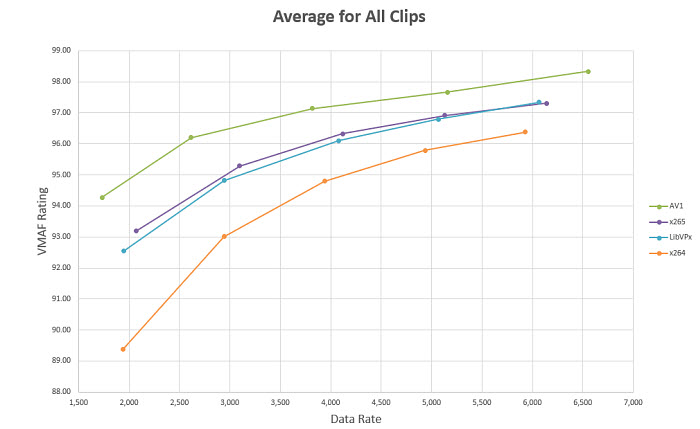
4. AV1 vs HEVC - Encoding/Decoding Time
Summary: AV1 codec requires 3x the encoding time of HEVC/H.265
Based on earlier tests, AV1 requires 3x the encoding time of HEVC x265 and LibVPx. Also indicated in the MSU reports, AV1 encoding is about 2500-3000 times slower than competitors while X265 is about 10-15 times slower. Since AMD, Nvidia, Intel, Qualcomm and most hardware manufacturers already support HEVC, a hardware accelerated HEVC encoder can drive the HEVC encoding to about 5x times faster, which will also save more CPU and battery while providing high quality than software processing.
However, the latest version AOM-AV1 3.5 has much more efficient CPU encoding. It features a new API and features to improve the speed and momery optimizations. Testing showed a 34% encoding time reduction for 1080p videos at best on a 16-thread CPU and 18-20% encoding time reduction for 2160/4K resolutions on a 32-thread CPU. Therefore, streaming software can offer better experience with AV1 than HEVC.
On the hardware side, AV1 has less support than HEVC. Therefore, there is a long way to go before AV1 become widespread for streaming (below is the decoding and encoding time of AV1, X265, and main competitors, video: 2k trailer, souce: texpion).

The dull hardware support of AV1 technology ends up the result that the AV1 playback & encoding will take longer time than HEVC. Let's see the AV1 encoding and decoding:
Don't worry about the AV1 decoding as it's already supported by major silicon players like AMD RDNA 2 GPUs, NVIDIA GeForce 30- and 40-Series GPUs, Intel Xe and Arc GPUs, as well as mobile chips like the Samsung Exynos 2100 and 2200, various MediaTek Dimensity SoCs, and Google's Tensor processor.
The hardware encoding of AV1 is not as bright as HEVC. By far, Intel's new Arc Alchemist A Series graphics cards are the first graphics cards on the market with GPU AV1 encoders. The NVIDIA just released it's newest graphic card, GeForce RTX 40 Series GPUs, which feature the 8th-generation of Nvidia video encoder - NVENC, also brings the support for AV1 encoding. According to the tests performaned by Nvidia, now the new AV1 encoder can deliver 40% inscreased efficiency with higher resolutions and quality.
(Below is the encoding speed tests conducted by Nvidia with Nvenc AV1 vs HEVC predecessor H.264.)
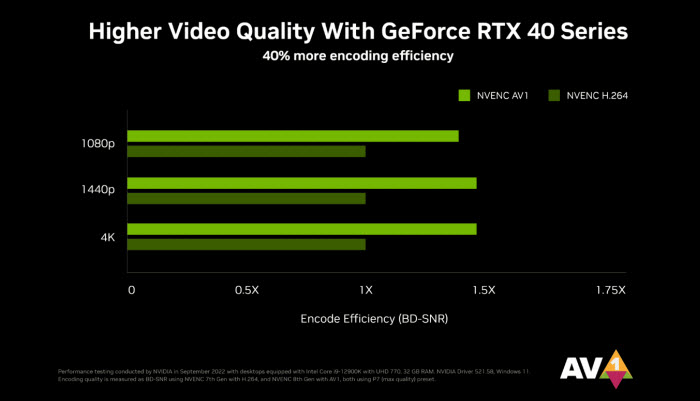
As for ordinary consumer, that could be a strong signal for more tech giants get in & with their efforts to push forwards the application of AV1 in the internet video sharing. Considerably a brighter future will be promised with the joint of big company like NVIDIA and AMD.
5. AV1 vs HEVC - Compatibility
Summary: Hardware and software support for AV1 codec is still not as good as HEVC
iPhone, iPad, Samsung, Google Note/Pixel, Ximao, LG, HTC mobiles, and TVs from Sony, LG, Samsung, etc. all have builg-in ability to decode HEVC. Leading hardware manufacturers like Qualcomm, Intel, Nvidia,Microsoft, Apple, Broadcom, Ambarella, etc. all add support to HEVC codec. Most modern cameras, such as GoPro, DJI drones, Canon, and some other DSLR record videos using HEVC codec. HEVC is also supported by various software programs, like edtiors FCP X, Premiere Pro, DaVinci Resolve, and web browsers. However, sometimes error may occur like, can't play HEVC files without HEVC Video Extensions, VLC can't play HEVC files, VLC won't support HVC1 codec, etc.
As of writing, AV1 codec is mainly used by web browers Google Chrome and Mozilla Firefox. It's not compatible with Safari, Microsoft Edage, and Opera. Windows 10 enables AV1 video playback on condition you install AV1 video extension beforehand. Even VLC can't play AV1 very well.
While compared to HEVC, AV1 is not as widely used, its future looks increasingly optimistic. There is growing hardware support for the AV1 codec:
- All Android tablets and phones that need to run Android 14 are required to support AV1.
- Netflix mobile app for Android and iOS is already distributing AV1 streams.
- NVIDIA has worked with OBS Studio to add AV1 support to its new software release, which has added support for HEVC/H.265 to increase the video compression rates by 15% across a wide range of NVIDIA GPUs in the OBS 28.0 release.
- Discord is enabling AV1 end to end for the first time.
Verdict
AV1 vs HEVC, which is the better codec for the future? When the 50%-more-efficient H.265 comes out, H.264 didn't become obsolete. Even though AV1 has 30% better performance, it's in early stage now. That means, most devices now support HEVC only. That said, we believe AV1 is more promising, especially for online streaming of large-resolution content.
FAQs about AV1 vs HEVC
1. Is AV1 higher quality?
Yes, AV1 (AOMedia Video 1) generally offers similar or even better video quality compared to HEVC at lower bitrates. This means that with AV1, you can achieve the same level of visual quality as HEVC but with potentially smaller file sizes. This is due to the advanced compression techniques and efficiency improvements that AV1 brings to the table.
2. What is AV1 vs HEVC vs VP9?
AV1 tends to offer better compression efficiency and potentially smaller file sizes compared to HEVC, making it an attractive option for high-quality video streaming. HEVC is widely adopted and offers excellent compression efficiency. VP9 provides a good balance between quality and file size and is used by platforms like YouTube.
3. What is the difference between HEVC and AV1 OBS?
HEVC (H.265) and AV1 are video encoding standards available in OBS Studio for streaming and recording. OBS Studio added support for AV1 encoding in version 29.1. HEVC is well-established and supported in various devices and platforms. AV1 in OBS is experimental, with limited hardware support.
4. Why is AV1 encoding better?
AV1's combination of improved compression efficiency, open-source nature, and future-proofing make it an attractive choice for video encoding, particularly in scenarios where high-quality video needs to be delivered efficiently and cost-effectively.



